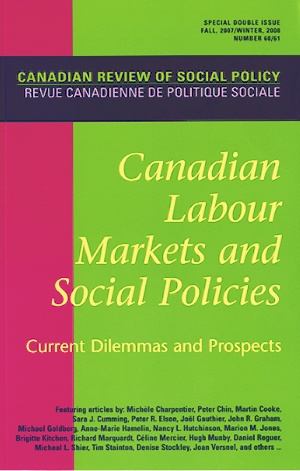Linking Transportation Inadequacies to Negative Employment Outcomes
Résumé
Individuals in advanced industrialized countries with difficulties in labour market participation are frequently presented with life and social skills training courses, and labour market integration policies, that seek to provide skills attributable to the individuals. Scholarship, though, has not provided sufficient attention to barriers that are considered external to individuals. One such external barrier creating limits on positive labour market participation is access to adequate transportation. This article highlights the relationship between transportation accessibility and positive employment outcomes from the perceptions of people who have difficulties in securing and maintaining employment. The experiences of seventy-two interviewed participants provide strong evidence of how inadequate access to transportation can influence access to jobs, inhibit employment retention, and intersect with other dimensions of social capital that are essential to labour market participation. The article concludes that transportation is central to economic and social policies regarding labour market participation, and proposes strategies that might better equip vulnerable populations for participation in labour markets. Keywords: labour markets, employment, skills training, social policy, transportation Les citoyens des principaux pays industrialise's ayant des difficulte's h inte'grer le march6 du travail ont souvent la possibilite' de suiwe des fornations afin d'acque'rir des aptitudes sociales et pratiques, et be'nkficient de politiques d'inte'gration au marche' de l'emploi, les toutefois, ne s'est pas suffisamment penchie sur les obstacles h l'emploi indpendants des personnes concernkes. Cacds h un moyen de transport adiquut constitue un des obstacles externes qui limitent la participation positive au rnarchi de l'emploi. L'article met en lumi?re la relation entre l'acc?s au transport et des risultats positifs en muti?re d'emploi, du point de vue des personnes qui iprouvent des difficulte's h trouver et h conserver un emploi. L'expirience vicue par les 72 participants interrogis prouve de fason convaincante qu'un acc?s i d q u a t h un moyen de transport influence l'acc2s h l'emploi, entrave la r6tention des travailleurs concernis et recoupe d'autres facettes du capital social essentielles h la participation au march6 de l'emploi. Cauteur conclut que le transport est un ikment central des politiques iconomiques et-sociales relatives h la participation au march6 du travail, et propose des stratigies qui pourraient permettre aux personnes vulnirables de participer plus activement au march6 de l'emploi. Mots clh : marchis du travail, l'emplois, les aptitudes sociales et pratiques, politique sociak , transport unes et les autres visant l'acquisition de compe'tences par des particuliers. La rechercheTéléchargements
Publié-e
Comment citer
Numéro
Rubrique
Licence
1-The author guarantees that the manuscript is an original work not published elsewhere in print or electronically in whole or in part, except in abstract form, that the author has the full power to make this contribution, and that the manuscript contains no matter libelous or otherwise unlawful or which invades the right of privacy or which infringes any proprietary right.
2-The author guarantees that the manuscript has not been previously published in print or electronically and that if the manuscript contains any tables, figures or images fully reproduced or closely adapted from previously published material, the author must obtain the necessary permission from the author/publisher holding the original copyright prior to publication in CRSP. The author may be required to produce evidence of permission granted to CRSP’s editors.
3-As a condition of publication in CRSP, the author assigns all copyright to CRSP, including but not limited to the right to publish, republish, and otherwise distribute this manuscript in print, electronic, or other formats. As CRSP is a non-profit interdisciplinary scholarly journal, the author will receive no royalty or other monetary compensation for the assignment set forth in this agreement.
For the purpose of full disclosure, CRSP will not normally use the content provided by the author in a commercial venture, but for the purpose of disseminating the author’s content to as many readers as possible. For distribution, third parties engaging in commercial activities may be contracted to distribute the content globally, and such parties may make a profit out of the author’s content in their normal course of business. CRSP will not pay the author or reimburse the author in any form based on such commercial activities because the conduct of such commercial activities is outside the control of CRSP.
Any future reference to or use of this published material by the authors must acknowledge CRSP as the original place of publication.
PERMISSION REQUEST/ARCHIVING
Permission is given to author(s) receiving funding via Tri-Council Agencies, the Canadian Institutes of Health Research (CIHR), the Natural Sciences and Engineering Research Council of Canada (NSERC) and the Social Sciences and Humanities Research Council (SSHRC), to make their publications freely available in an Open Access repository within the stated deadline by the Tri-Council Agencies (12 months following publication). Archiving of publication must be a manuscript copy bearing none of the CRSP headers, footers or any other distinguishing marks. No links to the article on the CRSP website is permitted.
Permission requests from third parties to reproduce articles in part or full in academic/educational publications can be directed to the managing editor of CRSP, and will not be unreasonably denied.

